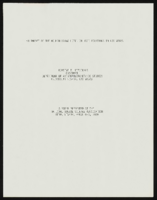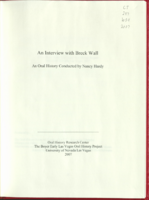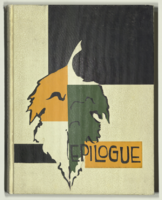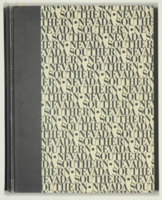Search the Special Collections and Archives Portal
Search Results

Luella Knuckles interview, February 28, 1980: transcript
Date
Archival Collection
Description
On February 28, 1980, Paul Gentle interviewed Luella Knuckles (b. 1910 in Impolla, Texas) about life as an African-American in Las Vegas, Nevada. Knuckles talks to Gentle about the conditions that African-Americans lived in and the discrimination they faced when first arriving to the city. Knuckles, in particular, spends a portion of the interview discussing the segregated layout of Las Vegas and the jobs and opportunities that were available for the black community in a segregated town. Moreover, she provides anecdotes about her deceased husband’s employment, their experience buying and repairing a property by themselves, and the changes in attitudes as the city desegregated. The conversation later focuses on the Church’s place in the African-American community, education and participation in church activities, and Knuckle’s personal love for books and Bible study.
Text

"An Impact of the Moulin Rouge Hotel on Race Relations in Las Vegas": paper by Roosevelt Fitzgerald
Date
Archival Collection
Description
From the Roosevelt Fitzgerald Professional Papers (MS-01082) -- Unpublished manuscripts file. Presented to the National Social Science Association, Reno, Nevada.
Text

Transcript of interview with Bert Hood by Dennis McBride, June 16, 1998
Date
Archival Collection
Description
Bert Hood is celebrated in Las Vegas's gay history for his ownership of the Red Barn, one of our most famous gay bars. This is another of those serendipitous interviews I've conducted with someone I very much wanted to interview but didn't know how to find. Bert's in Las Vegas from Oklahoma City for just a short while visiting old friends, and I was lucky enough to have found him through Bill Schafer, president of the Southern Nevada Gay and Lesbian Historical Society. I want to thank you, Bert, for donating these two hours of your vacation time to me so I can preserve your stories for the gay community.
Text

Transcript of interview with Breck Wall by Claytee White, July 3, 2003
Date
Archival Collection
Description
Breck Wall grew up tough and honed that toughness into solid business acumen. He also grew up talented and that talent took him to movie sets in Los Angeles and allowed him to produce shows in Dallas, New York, Tahoe, and Las Vegas. Though his family became nonexistent early in his life, he formed his own broad family from a group of faithful friends around the country. One special friendship makes this interview worth reading — the one with Jack Ruby. Wall's talent though is the primary reason that this interview is good history. He did many shows and had up to five running simultaneously. The creative process was the fun part that allowed him to produce Passion , Alias, and Night Beat among many others. Bottoms Up is his signature production and has been at several venues in Las Vegas for the past 40 years. Breck Wall is living a full and interesting life. A good example is a phone call from The London Times'. "Mr. Wall?" 1 said, "Yes." He said, "Are you aware that your best friend, Jack Ruby, just shot Oswald?" I said, "What" I was in shock. I said, "No I'm not." And I talked to him very briefly,and I hung up the phone." The phone continued to ring as calls came in from the Dallas Morning News, The Washington Post, The New York Times, etc, etc.
Text

Transcript of interview with Margaret Price by Joanne Goodwin, March 5, 1997
Date
Archival Collection
Description
When farm-girl-turned-waitress, Margaret "Maggie" Price, came to Las Vegas from Ohio in 1950 with her husband, Francis "Frank" Price, she had no idea what was in store for her in the hot desert oasis. Maggie's career spanned a period of historical transformation in Las Vegas when Downtown was becoming overshadowed by the development on the Las Vegas Strip. Vaudeville and striptease acts were still alive, but the arrival of big-named acts, such as the Rat Pack, Barbara Streisand, and the King himself, Elvis Presley, were just beginning to take the lead. Organized crime was still a prominent part of the culture and brothels still operated somewhat openly. The three decades Maggie and Frank worked in Las Vegas provided them with front-row seats for the birth, transformation, and occasional death of numerous casinos, including the Sahara, the Flamingo, the Sands, the Dunes, the Tropicana, and the International. Initially going to work as a waitress at the El Rancho Vegas, Maggie
Text

Transcript of interview with Louis Evans by Jeannettte Lonpergan, February 17, 1976
Date
Archival Collection
Description
On February 17, 1976, Jeannette Lonpergan interviewed well driller and dairy worker, Mr. Louis Evans (born on August 8th, 1914 in Jones County, Iowa) in his home in Las Vegas, Nevada. Mrs. Lonpergan’s husband, Mr. Dennis Lonpergan, was present during the interview and joined in on the discussion. Mr. Louis Evans’ wife, Mrs. Evans, was also present during the interview. Mr. Evans relocated to Nevada from Iowa in search of employment. Construction on the Hoover Dam had begun at this point; Mr. and Mrs. Evans recall their earliest recollections of Nellis Air Force Base and McCarran Airport. The interview covers the history of Nevada from Mr. Evans’ perspective. Mr. Evans discusses the paving of roads, employment, religious activities, housing developments, early above ground atomic tests, social and environmental changes and mining in Nevada.
Text

Transcript of interview with Harriett Thornton Hicks by Claytee D. White, October 28, 2009
Date
Archival Collection
Description
Harriett Thornton Hicks was born June 8, 1913,in Parowan, Utah; the thirteenth child of 14. She tells of her pioneer family who dwelled in two log cabins—one for cooking and one for sleeping. In 1931, she moved to Las Vegas to join two older sisters who had relocated here. She was picked up at the train by young Charles Hicks, who was a friend of her sisters. Charles had a car and offered to provide transportation. Within three years, the two were married. She quit her drug store job to raise a family and he worked for the railroad, the only business at the time in Las Vegas. At the age of 96, Harriett recalls a range of community milestones, such as the Boulder Dam, the news of Pearl Harbor bombing, Fremont Street, the Biltmore Hotel, and how to live in a city with mob influences.
Text

Transcript of interview with John L. Houck by Perry L. Smith, March 14, 1981
Date
Archival Collection
Description
On March 14, 1981, collector Perry L. Smith interviewed police officer, John L. Houck, (born May 11th, 1944 in Butte, Montana) in his home in Las Vegas, Nevada. This interview offers an overview of the history of Las Vegas and insider details on early Las Vegas police work. The interview concludes with a discussion on Henderson and Boulder City.
Text

Epilogue: Nevada Southern University Yearbook, 1963
Date
Description
Yearbook main highlights: schools and departments; detailed lists with names and headshots of faculty, administration and students; variety of photos from activities, festivals, campus life, and buildings; campus organizations such as sororities, fraternities and councils; beauty contest winners; college sports and featured athletes; and printed advertisements of local businesses; Institution name: Nevada Southern University, Las Vegas, NV
Mixed Content

Epilogue: Nevada Southern University Yearbook, 1964
Date
Description
Yearbook main highlights: schools and departments; detailed lists with names and headshots of faculty, administration and students; variety of photos from activities, festivals, campus life, and buildings; campus organizations such as sororities, fraternities and councils; beauty contest winners; college sports and featured athletes; and printed advertisements of local businesses; Institution name: Nevada Southern University, Las Vegas, NV
Mixed Content
